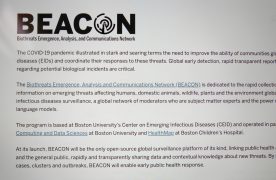A push to stop American involvement in Iraq and increase awareness of U.S. policies were key issues addressed by Boston area high school students in a press conference last night. The 10 representative students, as part of Boston Mobilization’s Youth For Peace Project, each read a short essay outlining their reasons for opposing the war in Iraq.
Boston Mobilization, an organization that promotes peace and social justice, has a strong focus on youth involvement, according to a press release. Students from middle school and high school are given opportunities to hold workshops, attend summer camps and write for Spark magazine, a publication offering information to students on local, national and international issues, the press release stated.
The students at the press conference were representatives promoting tomorrow’s Student Day of Action, during which they will participate in various rallies, walkouts and teach-ins to raise awareness about U.S. involvement in the war. They will also hold a citywide peace rally at 5:30 p.m. in Copley Square.
Boston City Councilor Chuck Turner spoke at the conference, voicing praise to students for being politically active at such a young age.
‘We have to encourage our youth to be involved,’ he said. ‘Until we all shape our view that the U.S. can be a source of peace instead of destruction, we will continue to see our resources depleted by the military.’
Eddie Shanahan of Newton High School spoke about his brother, who joined the army and is now stationed in Kuwait near the Iraqi border. According to Shanahan, there are now 10 times as many men stationed at the base than there were last year.
‘I’ve almost given up hope,’ he said. ‘I think we are going to war no matter what. But when I heard about the peace movement during the Vietnam War and how many people it saved, I decided it was the only thing I could do at this point.’
Shanahan, as well as several other students, voiced a general distrust of the administration since President Bush’s push for action against Iraq.
‘I’m convinced that Bush is doing this because of internal politics,’ Shanahan said. ‘Its easy to say you care about what happens in the world but I think he is mostly worried about getting himself another four years in office.’
Several students discussed the ignorance of their peers regarding international issues, especially the war in Iraq.
‘The news isn’t always accurate and there are a lot of outside interests,’ said Isa Nakazawa, a Wellesley High School student. ‘A lot of kids are influenced by what their parents think, and they might have conflicting views, so they feel lost.’
Although groups like Boston Mobilization may create awareness among students about international issues, several students at the conference agreed empowerment begins in the classroom.
‘Education is something we all value,’ said Lisa Saperstein, a Newton High School student. ‘It would be worthwhile for teachers to focus on current events, and specifically global issues, which would give kids a chance to formulate their own opinions.’
Agreeing education is the first step, many students still asserted they have no idealistic ideas of spreading change overnight. Their goals remain small: reaching students in their areas and organizing events to raise awareness. Eventually, students will begin voicing their concerns and making changes, before it is too late, they said.
The long-term effect is more important, according to Arlington High School student Dan Hurowitz. He spoke specifically about his concerns regarding a possible increase of terrorist activity toward the United States if the war with Iraq continues.
‘The repercussions of this war will effect my generation, not those who are in power now,’ he said. ‘As people with empathy, we want to say that this is a war we can’t win.’
This is an account occasionally used by the Daily Free Press editors to post archived posts from previous iterations of the site or otherwise for special circumstance publications. See authorship info on the byline at the top of the page.












